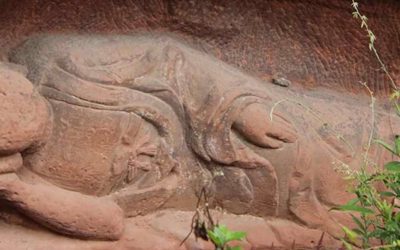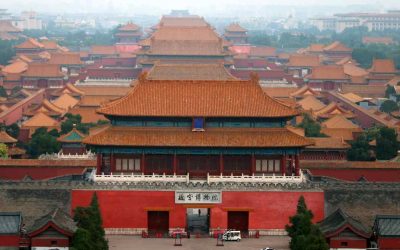Funeral Masks of the Zhuang people in nationalities Museum of Kunming
Known as Longyawai Masks, they are funeral ceremony masks popular in the Zhuang communities of Wenshan Autonomous Prefecture, on the east of Yunnan Province.
The masks are shaped as a lion, they are in fact a cow head called «Longyawai», a gift given by the living to the dead, symbolizing that is a real cow for feeding them in the afterlife. The purpose is to let the dead live a carefree life in underworld with no concern of the human world.
These masks are made of paper pasted on a bamboo frame and are used together with two grim face masks.
Three people wear the three masks to dance on the day commemorating the dead and the following day for the funeral procession.

The museum exhibits three large masks, one with a lion’s head, one cow’s head and one with a shepherd’s head. They are very elaborate and of complex design, with huge mouths, eyes like round mirrors, and sometimes with fabrics hanging to cover the wearer. There are two smaller and simpler ones, one with the face of a monkey, used by the companions in the procession.
Yunnan Nationalities Museum, in Kunming, has one of the best collections of masks in China.
References:
–Masks in the Yunnan Nationalities Museum. Download the free book.
Last posts
Buddhist Immersion from Shanghai: No Need to Board a Plane—Paradise Is Right at Your Doorstep
Buddhist Immersion from Shanghai: No Need to Board a Plane—Paradise Is Right at Your Doorstep Residents of Shanghai eager to learn more about Buddhist art and history often think they must undertake long journeys to reach the sacred mountains of this religion. What...
The Lost Mythology of Ancient China
The Lost Mythology of Ancient China Reconstructing the mythology of ancient China is a painstaking task that tries to characterize some legendary figures and situations based only on the few sentences about them found in later works by philosophers and historians. The...
How a Eunuch Was Created in 19th-Century China
How a Eunuch Was Created in 19th-Century China A wealthy eunuch would purchase a boy from a poor family. This boy had to be between seven and ten years old. He would be kept confined for two weeks and subjected to a very strict diet; he ate little. Use of...







